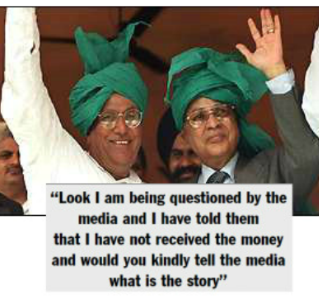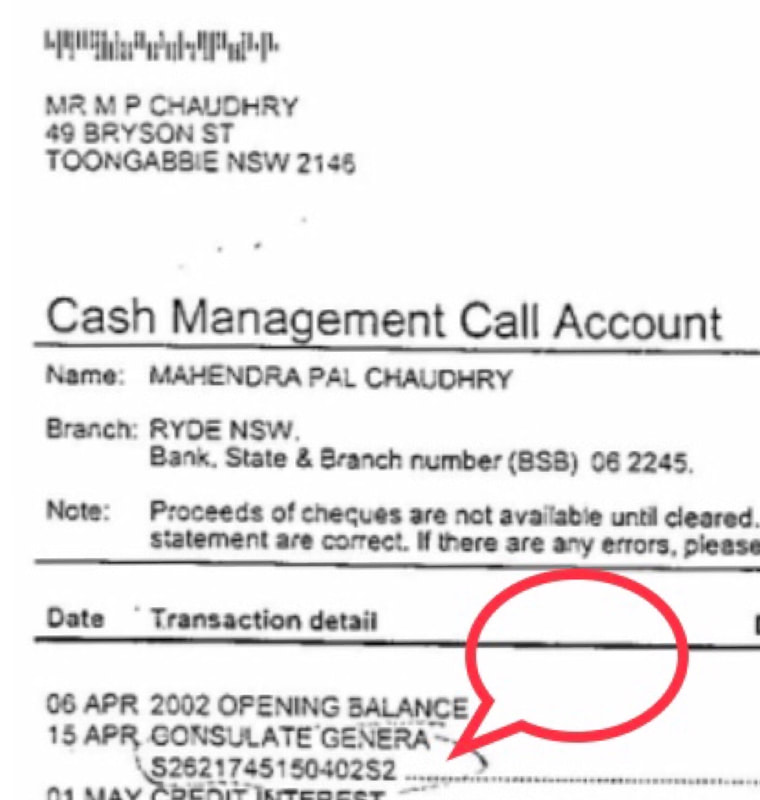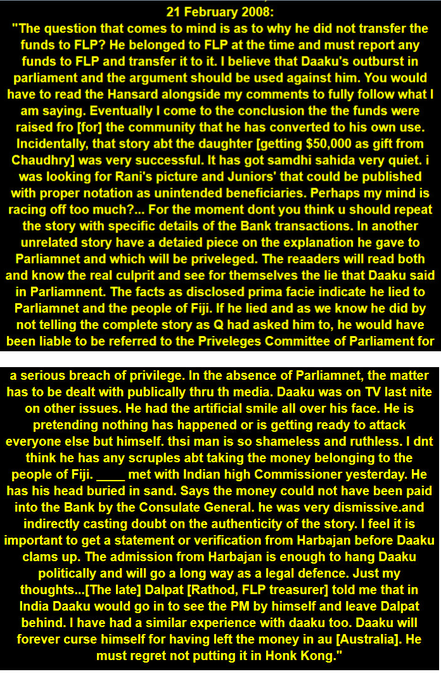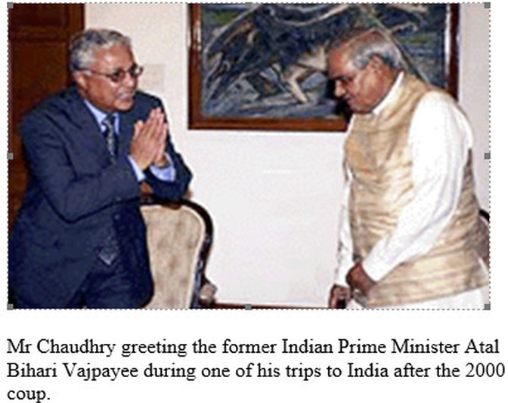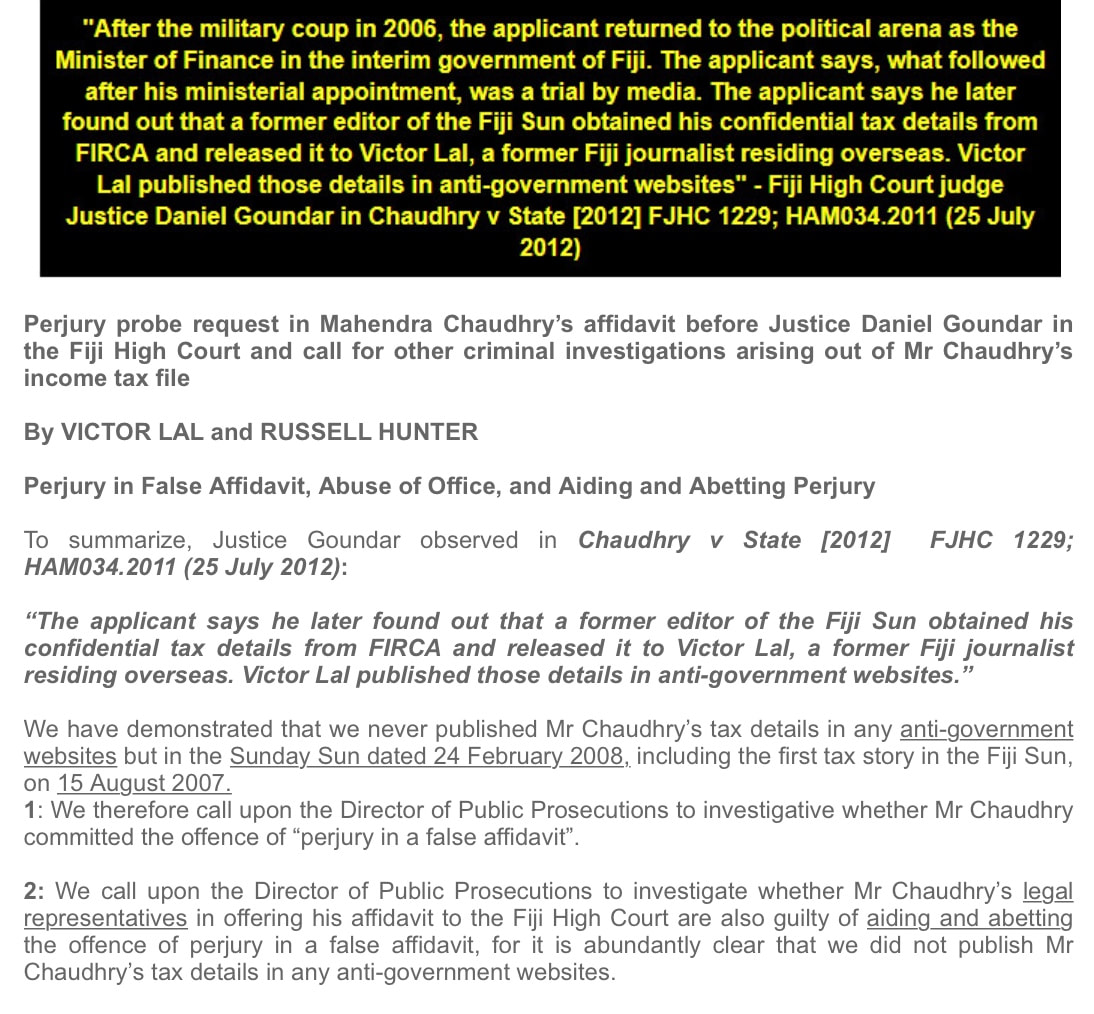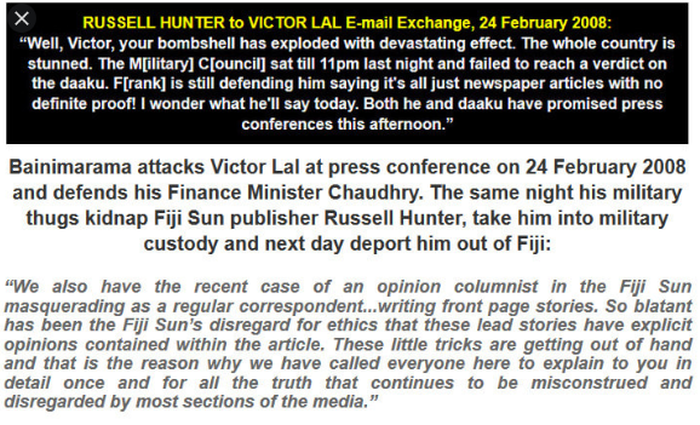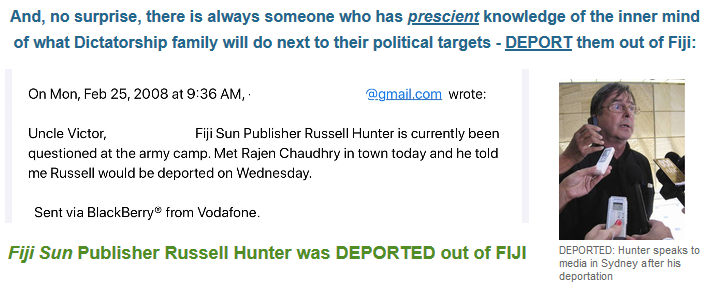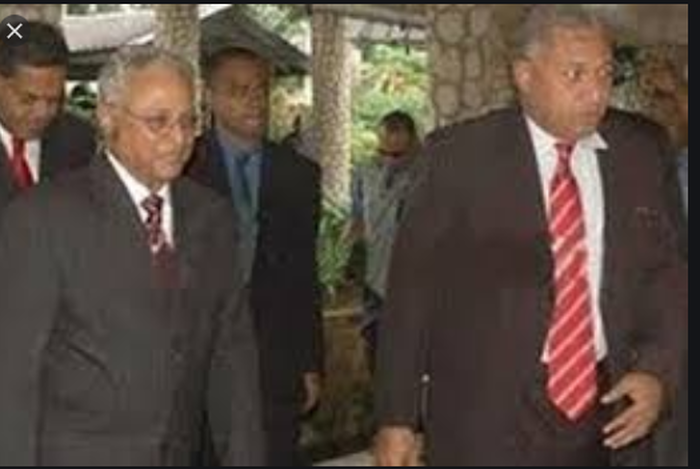"BACK TO 1999: Justice Fatiaki did not “quash” an “appeal.” The then publisher of the Fiji Times sought and was granted judicial review of the decision by the People’s Coalition Government led by Mr Chaudhry to decline renewal of my work permit. The Fiji Times sought to show that the minister had not followed procedure laid down in the relevant Act and had, therefore, acted outside his powers. In his judgement, Justice Fatiaki found that was not the case and I promptly left the country. There
was no appeal to quash." - RUSSELL HUNTER
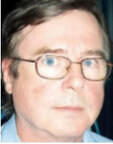 Russell Hunter
Russell Hunter Yes, Fiji Labour Party, let’s indeed set the record right
By RUSSELL HUNTER
Charlie Charters is well able to defend himself but in its Facebook attack on him, the FLP trots out its repeated inaccuracies and utterly erroneous interpretations regarding myself and the Fiji Times during my tenure there as editor-in-chief from 1997 to 2003. These seem to have become accepted as part of FLP lore which is a great pity because they are wrong.
At this stage I should point out that I have no axe to grind here. Having retired, I don’t and almost certainly won’t work in Fiji. My interest here is in setting the record straight.
While it’s true to say that Mr Chaudhry was out of the country when I was abducted by the military and deported in February 2008, to claim that he didn’t know of it stretches credulity too far.
And to further claim that such matters would not be discussed in Cabinet is quite wrong. Let’s remember that there was no real functioning Cabinet at the time of my deportation. Cabinet in effect was Bainimarama and Khaiyum (little seems to have changed there). Nevertheless there were meetings and Mr Chaudhry would have been present at some of them.
It’s also known that the matter of my work permit was discussed in Cabinet in 1999. This Cabinet would have been chaired by Mr Chaudhry as prime minister. Now if such matters were deemed worthy of Cabinet in 1999, why not in 2008? That, let’s remember, was five years after I’d left the Fiji Times. It’s not clear to me why the FLP would want to insist that Mr Chaudhry had nothing to do with my illegal deportation.
The FLP also seems to be at pains to avoid the truth, as revealed in the Fiji Sun, that millions of dollars collected to assist poor Indo-Fijians in the wake of the Speight coup found their way into Chaudhry bank accounts in Australia and New Zealand.
People will draw their own conclusions.
Back to 1999, Justice Fatiaki did not “quash” an “appeal.” The then publisher of the Fiji Times sought and was granted judicial review of the decision by the People’s Coalition Government led by Mr Chaudhry to decline renewal of my work permit. The Fiji Times sought to show that the minister had not followed procedure laid down in the relevant Act and had, therefore, acted outside his powers. In his judgement, Justice Fatiaki found that was not the case and I promptly left the country.
There was no appeal to quash.
As a side note it may be of interest that Mr Chaudhry insisted that all contact at this time with the Fiji Times be conducted through an intermediary. This same intermediary told the publisher that relations could be vastly improved if he would only get rid of me and appoint as editor-in-chief, the FLP’s own nominee. (Not that the government was seeking to interfere with the media. Heaven forbid.)
Which brings us to that tired old FLP furphy that the Fiji Times was anti-Chaudhry. The party’s response to Mr Charters says he ”needs to look at the plethora of independent literature that is available today that chastises the Fiji Times for its coverage of the Chaudhry government and the role it played in inciting the 2000 coup.” It omits to name a single one of this plethora. Perhaps it would care to do so.
All the literature I have read has been so tainted as to be meaningless and in at least one case laughable. If there is a properly independent piece of literature that supports the party’s assertions I’d be grateful to have an opportunity to read it.
But it seems the FLP prefers to rely on sweeping generalisations about an absence of training and the presence of some “hidden agenda” in the Fiji Times’ editorials and news reporting. At the risk of being repetitive, there was extensive training while any independent examination of the Fiji Times editorials will show that the number of pro-government/Chaudhry opinions outnumbered anti-government ones during the tenure of the People’s Coalition Government. The same can be said of the news coverage.
All this only illustrates the FLP conviction – and it’s far from alone in this – that anything short of adulation in the media is an attack. Of course that is simply not so.
The FLP is fully entitled to hold and express opinions – but it cannot claim them as fact.
I hope this goes some way to setting the record right.
By RUSSELL HUNTER
Charlie Charters is well able to defend himself but in its Facebook attack on him, the FLP trots out its repeated inaccuracies and utterly erroneous interpretations regarding myself and the Fiji Times during my tenure there as editor-in-chief from 1997 to 2003. These seem to have become accepted as part of FLP lore which is a great pity because they are wrong.
At this stage I should point out that I have no axe to grind here. Having retired, I don’t and almost certainly won’t work in Fiji. My interest here is in setting the record straight.
While it’s true to say that Mr Chaudhry was out of the country when I was abducted by the military and deported in February 2008, to claim that he didn’t know of it stretches credulity too far.
And to further claim that such matters would not be discussed in Cabinet is quite wrong. Let’s remember that there was no real functioning Cabinet at the time of my deportation. Cabinet in effect was Bainimarama and Khaiyum (little seems to have changed there). Nevertheless there were meetings and Mr Chaudhry would have been present at some of them.
It’s also known that the matter of my work permit was discussed in Cabinet in 1999. This Cabinet would have been chaired by Mr Chaudhry as prime minister. Now if such matters were deemed worthy of Cabinet in 1999, why not in 2008? That, let’s remember, was five years after I’d left the Fiji Times. It’s not clear to me why the FLP would want to insist that Mr Chaudhry had nothing to do with my illegal deportation.
The FLP also seems to be at pains to avoid the truth, as revealed in the Fiji Sun, that millions of dollars collected to assist poor Indo-Fijians in the wake of the Speight coup found their way into Chaudhry bank accounts in Australia and New Zealand.
People will draw their own conclusions.
Back to 1999, Justice Fatiaki did not “quash” an “appeal.” The then publisher of the Fiji Times sought and was granted judicial review of the decision by the People’s Coalition Government led by Mr Chaudhry to decline renewal of my work permit. The Fiji Times sought to show that the minister had not followed procedure laid down in the relevant Act and had, therefore, acted outside his powers. In his judgement, Justice Fatiaki found that was not the case and I promptly left the country.
There was no appeal to quash.
As a side note it may be of interest that Mr Chaudhry insisted that all contact at this time with the Fiji Times be conducted through an intermediary. This same intermediary told the publisher that relations could be vastly improved if he would only get rid of me and appoint as editor-in-chief, the FLP’s own nominee. (Not that the government was seeking to interfere with the media. Heaven forbid.)
Which brings us to that tired old FLP furphy that the Fiji Times was anti-Chaudhry. The party’s response to Mr Charters says he ”needs to look at the plethora of independent literature that is available today that chastises the Fiji Times for its coverage of the Chaudhry government and the role it played in inciting the 2000 coup.” It omits to name a single one of this plethora. Perhaps it would care to do so.
All the literature I have read has been so tainted as to be meaningless and in at least one case laughable. If there is a properly independent piece of literature that supports the party’s assertions I’d be grateful to have an opportunity to read it.
But it seems the FLP prefers to rely on sweeping generalisations about an absence of training and the presence of some “hidden agenda” in the Fiji Times’ editorials and news reporting. At the risk of being repetitive, there was extensive training while any independent examination of the Fiji Times editorials will show that the number of pro-government/Chaudhry opinions outnumbered anti-government ones during the tenure of the People’s Coalition Government. The same can be said of the news coverage.
All this only illustrates the FLP conviction – and it’s far from alone in this – that anything short of adulation in the media is an attack. Of course that is simply not so.
The FLP is fully entitled to hold and express opinions – but it cannot claim them as fact.
I hope this goes some way to setting the record right.
 Chartering Chaudhry's Past
Chartering Chaudhry's Past LET’S BE CLEAR … about one thing
By CHARLIE CHARTERS
In all of the condemnations rightly raining down on this incompetent, vindictive shambles of a government over the USP fiasco, there is one Bainimarama critic who really should know better than to open his mouth at all.
In February and May 2008 the Fiji government used the same work-permit/national security excuse to deport Russell Hunter and Evan Hannah, the publishers of the Fiji Sun and Fiji Times respectively.
Both deportations were done in flagrant breach of court orders served on the respective military and immigration officers relating to live court proceedings. This makes the actions in 2008 arguably even more grave than this week's deportations of the USP vice chancellor and his wife.
Both newspapers had reported extensively – the Fiji Sun more so than the Times – on allegations of corruption against the military regime in general but the Minister of Finance Mahendra Chaudhry in particular.
Despite being on the losing end of two military coups, between January 2007 and August 2008 Chaudhry was happy to suckle on the teat of Bainimarama’s illegal regime, and bring his Labour Party along in support.
In addition to Finance, his portfolio also included national planning, public enterprises and reform of the sugar industry.
Apparently without irony, Chaudhry told the media being appointed to these positions by Bainimarama was a ‘strange twist of destiny’ as these were the same responsibilities he had under the late Timoci Bavadra when the first domino tumbled and Fiji’s wretched coup culture started on that infamous day in May 1987.
Sitting in Cabinet with Bainimarama and Sayed-Khaiyum, Chaudhry would at least have known about the deportations of Hunter and Hannah - if not possibly had an actual hand in them – as he was the particular focus of their reporting.
[Chaudhry has form here with screwing with expats whose actions do not align with his God-like expectation to be immune from criticism. In April 2000, his government refused to allow Hunter’s work permit to be renewed. PINA’s President at the time William Parkinson, of CFL and FM96, said the Chaudhry government was clearly attempting to interfere with the newspaper’s editorial independence. Parkinson said the Fiji Times (then Hunter’s employer) was being victimised by the government because the newspaper was doing what any decent news organisation should be doing – informing the public without fear or favour. But it seemed the Chaudhry government did not like scrutiny, Parkinson said.]
Chaudhry’s position today is that what Bainimarama is doing in 2021 amounts to ‘Gestapo-style behaviour’. But surely, if it was Gestapo this year, it was Gestapo in 2008 when he was the direct beneficiary and maybe instigator?
‘How can such conduct [by the USP vice chancellor] be seen as a threat to the public safety and the defence and security of Fiji?’ Chaudhry asked in an official Labour Party statement issued yesterday. That's a question that 2021 Chaudhry could well ask of 2008 Chaudhry targetting two newspaper publishers.
‘I call on the people of Fiji to protest in the strongest terms against such blatant abuse of authority to protect corrupt elements in our society. It is a clear case of politics of fear at work – an attempt to crush all forms of opposition and criticism against the [FijiFirst] government,’ he concluded.
The reporting done by Hunter and Hannah’s newspapers was subsequently vindicated when Chaudhry was convicted in 2014 of actions that 'defrauded the country’s reserve bank', according to the ABC.
And just as Hunter and Hannah's reporters were highlighting and investigating allegations of deep-seated corruption and self-dealing, so it is that the scrutiny of the USP's politically connected previous vice chancellor that caused this vice chancellor and his wife to be manhandled out of the country.
To the best of my knowledge, Chaudhry has never explained in detail why in January 2007, of all of the options he had and with all of that experience of the corrosive effect of military coups, the one he chose was to masipolo with Bainimarama.
At such a critical date a nudge of support one way or the other would have proved crucial – especially as Chaudhry could speak for much of the organised trade union movement and the sugar industry.
His supporters now waffle about special circumstances and helping the nation at a time of crisis. To his credit Rabuka has at least apologised clearly and without reservation for his actions.
Interestingly, Fiji’s Human Rights Commission undertook an investigation into the circumstances of Hunter and Hannah’s deportation and quickly vindicated Bainimarama’s actions.
That investigation was led by Dr Shaista Shameem, sister to Ambassador Nazhat Shameem, Fiji’s Permanent Representative to the United Nations and recently elected the President of the United Nations Human Rights Council.
We have heard nothing from either Shameems since Bainimarama’s latest thuggish action against an expatriate professional whose apparent straight-talking and rectitude made him immediately a target for this wretched, thin-skinned and incompetent government.
Nor have we heard anything from Dr Shaista’s replacement, Ashwin Raj whose online connection to thesaurus.com must be down.
Why am I writing about this?
For the exact same reason, I think Rabuka should recuse himself from front-line politics.
Fiji needs political leadership that in all of their actions to date and in the future totally repudiate military coups and the military's current and presumed role in politics. The military is the least productive, least stable and most expensive government budget item.
It should never have been given the outsize role it has played in Fiji for almost 35 years. Perpetual shame should attach to those who have ever, by commission or omission, enabled it to do so.
By CHARLIE CHARTERS
In all of the condemnations rightly raining down on this incompetent, vindictive shambles of a government over the USP fiasco, there is one Bainimarama critic who really should know better than to open his mouth at all.
In February and May 2008 the Fiji government used the same work-permit/national security excuse to deport Russell Hunter and Evan Hannah, the publishers of the Fiji Sun and Fiji Times respectively.
Both deportations were done in flagrant breach of court orders served on the respective military and immigration officers relating to live court proceedings. This makes the actions in 2008 arguably even more grave than this week's deportations of the USP vice chancellor and his wife.
Both newspapers had reported extensively – the Fiji Sun more so than the Times – on allegations of corruption against the military regime in general but the Minister of Finance Mahendra Chaudhry in particular.
Despite being on the losing end of two military coups, between January 2007 and August 2008 Chaudhry was happy to suckle on the teat of Bainimarama’s illegal regime, and bring his Labour Party along in support.
In addition to Finance, his portfolio also included national planning, public enterprises and reform of the sugar industry.
Apparently without irony, Chaudhry told the media being appointed to these positions by Bainimarama was a ‘strange twist of destiny’ as these were the same responsibilities he had under the late Timoci Bavadra when the first domino tumbled and Fiji’s wretched coup culture started on that infamous day in May 1987.
Sitting in Cabinet with Bainimarama and Sayed-Khaiyum, Chaudhry would at least have known about the deportations of Hunter and Hannah - if not possibly had an actual hand in them – as he was the particular focus of their reporting.
[Chaudhry has form here with screwing with expats whose actions do not align with his God-like expectation to be immune from criticism. In April 2000, his government refused to allow Hunter’s work permit to be renewed. PINA’s President at the time William Parkinson, of CFL and FM96, said the Chaudhry government was clearly attempting to interfere with the newspaper’s editorial independence. Parkinson said the Fiji Times (then Hunter’s employer) was being victimised by the government because the newspaper was doing what any decent news organisation should be doing – informing the public without fear or favour. But it seemed the Chaudhry government did not like scrutiny, Parkinson said.]
Chaudhry’s position today is that what Bainimarama is doing in 2021 amounts to ‘Gestapo-style behaviour’. But surely, if it was Gestapo this year, it was Gestapo in 2008 when he was the direct beneficiary and maybe instigator?
‘How can such conduct [by the USP vice chancellor] be seen as a threat to the public safety and the defence and security of Fiji?’ Chaudhry asked in an official Labour Party statement issued yesterday. That's a question that 2021 Chaudhry could well ask of 2008 Chaudhry targetting two newspaper publishers.
‘I call on the people of Fiji to protest in the strongest terms against such blatant abuse of authority to protect corrupt elements in our society. It is a clear case of politics of fear at work – an attempt to crush all forms of opposition and criticism against the [FijiFirst] government,’ he concluded.
The reporting done by Hunter and Hannah’s newspapers was subsequently vindicated when Chaudhry was convicted in 2014 of actions that 'defrauded the country’s reserve bank', according to the ABC.
And just as Hunter and Hannah's reporters were highlighting and investigating allegations of deep-seated corruption and self-dealing, so it is that the scrutiny of the USP's politically connected previous vice chancellor that caused this vice chancellor and his wife to be manhandled out of the country.
To the best of my knowledge, Chaudhry has never explained in detail why in January 2007, of all of the options he had and with all of that experience of the corrosive effect of military coups, the one he chose was to masipolo with Bainimarama.
At such a critical date a nudge of support one way or the other would have proved crucial – especially as Chaudhry could speak for much of the organised trade union movement and the sugar industry.
His supporters now waffle about special circumstances and helping the nation at a time of crisis. To his credit Rabuka has at least apologised clearly and without reservation for his actions.
Interestingly, Fiji’s Human Rights Commission undertook an investigation into the circumstances of Hunter and Hannah’s deportation and quickly vindicated Bainimarama’s actions.
That investigation was led by Dr Shaista Shameem, sister to Ambassador Nazhat Shameem, Fiji’s Permanent Representative to the United Nations and recently elected the President of the United Nations Human Rights Council.
We have heard nothing from either Shameems since Bainimarama’s latest thuggish action against an expatriate professional whose apparent straight-talking and rectitude made him immediately a target for this wretched, thin-skinned and incompetent government.
Nor have we heard anything from Dr Shaista’s replacement, Ashwin Raj whose online connection to thesaurus.com must be down.
Why am I writing about this?
For the exact same reason, I think Rabuka should recuse himself from front-line politics.
Fiji needs political leadership that in all of their actions to date and in the future totally repudiate military coups and the military's current and presumed role in politics. The military is the least productive, least stable and most expensive government budget item.
It should never have been given the outsize role it has played in Fiji for almost 35 years. Perpetual shame should attach to those who have ever, by commission or omission, enabled it to do so.
FLP: Let’s set the record right
Charlie Charters’ opinionated piece “Let’s be clear” (fb) is coloured by a series of assumptions and misinformation, selective memory process, and tainted with his obvious antipathy towards certain people mentioned.
To put the record straight:
1. Despite widespread misconception amongst certain elite members of the media circle at the time, Mr Chaudhry had absolutely nothing to do with Russell Hunter or Evan Hannah being deported from Fiji in February and May, 2008.
At the time of Russell Hunter’s deportation, Mr Chaudhry was not even in the country. He had been overseas attending international meetings. He expressed shock when told about it.
Regarding Charters assumption that Mr Chaudhry must have been sitting in at Cabinet meetings where the deportations were discussed: he must be very naïve to even think that such things were discussed at Cabinet level. Such military-style operations are not carried out with Cabinet approval or sanction, Mr Charters!
For someone who chooses to be something of a commentator on past political events, it seems surprising that he can even assume that Mr Chaudhry was behind Hunter’s deportation. Did Charters willfully ignore the facts of the Chaudhry government’s action in dealing with the Russell Hunter case as against the method used by the Bainimarama regime in 2008.
The sudden deportation of VC Prof Pal Ahluwalia last week was similar in execution to that of Hunter and Hannah in 2008 - military (or Gestapo) style operations where officers swoop in suddenly, arrest and deport. You are given no time to protest, claim your rights or seek legal redress. In fact, the Hunter/Evan cases were before the courts but the authorities defied the legal proceedings to go ahead with the deportation.
Compare this with Russell Hunter’s experience with the Chaudhry government. Everything was done legally. His work permit was not renewed when it expired in December 1999. He was given 30 Days to leave the country. He was accorded the right to challenge the government decision in court and allowed to stay for the duration of his appeal. Justice Daniel Fatiaki gave a ruling in late April 2000 quashing the appeal, and Hunter had no choice but to leave.
The Chaudhry government did not renew Hunter’s work permit on the grounds that FT had breached a requirement of the work permit for a local be trained to take over. There was nothing sinister about the move. Fiji Times had repeatedly breached this requirement but the previous Rabuka government had done nothing about it.
In fact, senior editorial posts at the Fiji Times had been localized ever since Vijendra Kumar was appointed the first local Editor and later, Robert Keith Reid, associate editor. There was no post of editor in chief at the time. Kumar left in 1991 following several years of harassment by the military. A number of experienced, senior journalists left the country following the first two coups. FT had chosen to play racial politics thereafter.
It put virtual rookies in top editorial positions which gave them an excuse to bring in expatriates as “editor in chief” such as Russell Hunter. It is well known that during Russell Hunter’s tenure several senior Fiji Times journalists left for overseas knowing there was no scope for advancement for them at FT under its current policies. The company did very little to ensure locals were trained for the job. And so the Chaudhry government’s decision not to renew Hunter’s permit had every justification.
Charters quoted William Parkinson (then PINA President) claiming that the (Chaudhry) government was “clearly attempting to interfere with the newspaper’s editorial independence”. Interestingly, Justice Fatiaki did not seem to think so. There was no interference with the Fiji Times editorial policy despite the fact that day after day the FT was running a tirade against the Chaudhry government with news items and editorials that were clearly incendiary.
Charlie Charters needs to look at the plethora of independent literature that is available today that chastises the Fiji Times for its coverage of the Chaudhry government and the role it played in inciting the 2000 coup.
2. He also refers to Mr. Chaudhry’s tax allegations and claims that Hunter and Evan were “vindicated when Chaudhry was convicted in 2014 of actions that defrauded the country’s reserve bank”. The allegations had little merit and, as far as Hunter's involvement, largely vindictive.
Charters deliberately ignores the fact that a high powered independent inquiry in 2008 had completely cleared Mr Chaudhry of any breach of Fiji laws, including the Exchange Control Act. We ask Charters to tell us why the Fiji Times with its rookie editor failed to reveal the findings of the Inquiry – what ulterior motive would drive it to withhold such vital information from the Fiji public?
The charges laid against Mr Chaudhry in 2010 by the Bainimarama/Khaiyum regime were politically motivated to render him ineligible to contest the 2014 general elections. They began with 12 counts of charges which were finally whittled down to one: breach of the Exchange Control Act.
If it helps to clear matters for Charters, Mr Chaudhry’s case in the High Court was fought by non other than the late Peter Williams, QC. He is on record as saying that the charges against Mr Chaudhry #could #not #be #upheld by any self-respecting court. Mr Williams was a renowned human rights lawyer of international repute.
3. Finally, in his typically crude manner, Charters says that Chaudhry has “never explained in detail” why in January 2007 he chose to “masipolo” with Bainimarama. Chaudhry did not. He chose to respond to the call from the President Ratu Josefa Iloilo considering the state of the nation at the time. To get a full explanation of why he acceded to the President’s call for help, Charters might want to read a chapter by Mahendra Chaudhry titled “Democracy vs Good Governance” in the book The 2006 Military Takeover in Fiji edited by Fraenkel, Firth and Lal.
There were many who believed there was "something rotten", so to speak, in the state of Fiji just prior to the 2006 takeover - they offered to help, at their own volition, to put things right.
The late ANAND SINGH, former deposed FLP Attorney-General on
his deposed Prime Minister Mahend Chaudhry:
"He is a FRAUDSTER who needs to be EXPOSED. The facts as disclosed prima facie indicate he lied to Parliament and the people of Fiji". Ironically, in the 1999 Russell Hunter case, it was Singh who was embroiled in the visa extension saga
DENIAL: | LIU MURIS: FLP's former Attorney-General and recently deceased ANAND SINGH (along with Chaudhry's former DEPOSED Cabinet Minister, Dr GANESH CHAND) had helped us track down Chaudhry's $2million. Dr Chand used his expertise to analyse all of Chaudhry's tax records dating back to 1993. Later, Singh went on to defend Chaudhry before the Fiji High Court over the tax charges. He never explained his U-Turn. Dr Chand also betrayed our trust and confidence. Politics Triumphed. We paid the ultimate price for SPEAKING TRUTH TO POWER. |
3: We request the Director of Public Prosecutions to establish on what grounds the original letter tendered from one Harbhajan Lal dated 9 September 2004 to FIRCA from Haryana in India was withheld [if it was] and a new letter from Delhi Study Group dated 12 October 2004 substituted in Mr Chaudhry’s affidavit before Justice Daniel Goundar in the Fiji High Court. The “Harbhajan Lal Letter” of 9 September 2004 states the money was collected in Haryana and part of it was transacted through the Indian Consulate in Sydney, Australia. Harbhajan Lal wrote from Haryana:
“Respected Chaudhry Saheb, Nameste. We are hale and hearty here and please accept our good wishes. I received your letter. You have asked for details of the funds. You may recall that when you were here in the year 2000, we had formed a committee, which requested you to leave Fiji and stay in Australia since the situation in Fiji was not safe and you were not secure there. The committee also assured you that it would collect funds for your settlement in Australia. Lakhs of people from Haryana including traders, businessmen, landlords and non-resident Indians contributed heavily for the cause. The amount was pouring in for three years, which was sent to you from the year 2000 to 2002. The total amounting to nearly AUD fifteen laks was sent to you with the help of Government of India through its Consulate General in Sydney. We sent AUD 503,000/- as first instalment in the year 2000. In 2001, AUD $486,890/- was sent and then in 2002 AUD $514, 149/- was sent.”
The “Delhi Study Group Letter” states, “This is to confirm that funds were collected in New Delhi and other parts of India, including NRI's (Non-Resident Indians) to assist Hon'ble Mahendra Pal Chaudhry, Former Prime Minister of Fiji in 2000-2002.”
5: We call upon the Director of Public Prosecutions to ask Mr Chaudhry who transferred the money from India – Delhi Study Group based in New Delhi or Harbahajan Lal in Haryana, India?
6: We request the Director of Public Prosecutions to establish whether Mr Chaudhry and Nalin Patel, in presenting to FIRCA the letter from Harbhjan Lal, whose content was materially false [re his enquiring the details of the funds etc] –Chaudhry (and Nalin Patel) committed a criminal offence under Fiji’s tax laws by offering a false document to FIRCA, namely the Harbhajan Lal letter.
7: We request the Director of Public Prosecutions to investigate the Suva accountancy firm of G. Lal & Co, Mr Chaudhry’s delegated tax agent to deal with FIRCA in 2004, to establish whether it was aware of the inconsistencies in the Harbhajan Lal-Chaudhry correspondence regarding the $2million, and whether the accountancy firm also had in its possession the Delhi Support Group letter dated 12 October 2004.
8: We request the Director of Public Prosecutions to establish whether Mr Chaudhry and Nalin Patel submitted Harbhajan Lal’s letter knowing its content was false in material respects to prevent FIRCA from pursuing the original source of the funds in Mr Chaudhry’s Australian bank account.
9: We request the Director of Public Prosecutions to investigate whether Mr Chaudhry, in presenting the Tax Amnesty submission to the Cabinet in September 2007 for endorsement, might have abused office as Interim Finance Minister and direct line manager of Fiji Island Revenue and Customs Authority (FIRCA), to benefit himself, and to escape any future criminal prosecutions for submitting late tax returns between 2000 and 2003. We have documentary evidence that in August 2007 Mr Chaudhry still owed FIRCA $57,000 in tax debt, due to be paid on 9 August 2007. His own $57,000 could have fitted into insufficient advance payment or even late payment amnesty.
10. We therefore request the DPP to establish whether Mr Chaudhry had taxes or returns outstanding and paid during the amnesty period he had ordered and hence gained avoidance of penalties, and if so, then a case for Abuse of Office as Finance Minister and line manager of FIRCA could be made against him.
11: We call upon the Director of Public Prosecutions to plead with the Fiji High Court to expunge the patently false claims made against us in Chaudhry v State [2012] FJHC 1229; HAM034.2011 (25 July 2012) – re that we published Mr Chaudhry’s tax details in anti-government websites. In conclusion, we leave you with the words of the great English judge, the late Lord Denning in King v Victor Parsons & Co [1973] 1 WLR 29, 33-34:
“The word 'fraud' here is not used in the common law sense. It is used in the equitable sense to denote conduct by the defendant or his agent such that it would be 'against conscience' for him to avail himself of the lapse of time. The cases show that, if a man knowingly commits a wrong (such as digging underground another man's coal); or a breach of contract (such as putting in bad foundations to a house), in such circumstances that it is unlikely to be found out for many a long day, he cannot rely on the Statute of Limitations as a bar to the claim: see Bulli Coal Mining Co v Osborne [1899] AC 351 and Applegate v Moss [1971] 1 QB 406. In order to show that he 'concealed' the right of action 'by fraud', it is not necessary to show that he took active steps to conceal his wrongdoing or breach of contract. It is sufficient that he knowingly committed it and did not tell the owner anything about it. He did the wrong or committed the breach secretly. By saying nothing he keeps it secret. He conceals the right of action. He conceals it by 'fraud' as those words have been interpreted in the cases. To this word 'knowingly' there must be added recklessly': see Beaman v ARTS Ltd [1949] 1 KB 550, 565-566. Like the man who turns a blind eye. He is aware that what he is doing may well be a wrong, or a breach of contract, but he takes the risk of it being so. He refrains from further inquiry least it should prove to be correct: and says nothing about it. The court will not allow him to get away with conduct of that kind. It may be that he has no dishonest motive: but that does not matter. He has kept the plaintiff out of the knowledge of his right of action: and that is enough: see Kitchen v Royal Air Force Association [1958] 1 WLR 563.”
The limitation statute’s aim is to prevent citizens from being oppressed by stale claims, to protect settled interests from being disturbed, to bring certainty and finality to disputes and so on. These are, as legal commentators have pointed out, laudable aims but they can conflict with the need to do justice in individual cases where an otherwise unmeritorious defendant can play the limitation trump card and escape liability.
We call upon the Director of Public Prosecutions to ask Mr Chaudhry which of the two letters – Harbhajan Lal or Delhi Study Group – is the lie – as they both can’t be genuine. Apart from the false accusations against us in his affidavit, the contents of the Harbhajan Lal letter dated 9 September 2004 does not accord with his bank statements from the Commonwealth Bank of Australia which he offered to FIRCA.
In our humble submission we beg the Director of Prosecutions to call upon the Fiji High Court to waiver the statute of limitation for prima facie there is evidence in the “Harbhajan Lal” letter that Mr Chaudhry obtained a favourable decision from FIRCA (an oversight on the part of FIRCA tax officers) through alleged fraud – the contents of the Harbhajan Lal letter does not square with his Australian bank statements.
Moreover, although we do not have a copy of Mr Chaudhry’s affidavit cited by Justice Goundar (despite requests for one from the Director of the Public Prosecutions) we call upon the Director of Public Prosecutions to examine the contents of both the Harbhajan Lal and the Delhi Support Group letters. If there are glaring disparities in the two letters than Mr Chaudhry must be deprived of the statute of limitation for the “fraud”, if any on his part, would be a continuing “fraud” since 2004 when he first offered Harbhajan Lal’s letter and now the Delhi Study Group letter in 2012 to explain away the $2million is his Australian bank account.
VICTOR LAL and RUSSELL HUNTER, 4 September 2012
“Respected Chaudhry Saheb, Nameste. We are hale and hearty here and please accept our good wishes. I received your letter. You have asked for details of the funds. You may recall that when you were here in the year 2000, we had formed a committee, which requested you to leave Fiji and stay in Australia since the situation in Fiji was not safe and you were not secure there. The committee also assured you that it would collect funds for your settlement in Australia. Lakhs of people from Haryana including traders, businessmen, landlords and non-resident Indians contributed heavily for the cause. The amount was pouring in for three years, which was sent to you from the year 2000 to 2002. The total amounting to nearly AUD fifteen laks was sent to you with the help of Government of India through its Consulate General in Sydney. We sent AUD 503,000/- as first instalment in the year 2000. In 2001, AUD $486,890/- was sent and then in 2002 AUD $514, 149/- was sent.”
The “Delhi Study Group Letter” states, “This is to confirm that funds were collected in New Delhi and other parts of India, including NRI's (Non-Resident Indians) to assist Hon'ble Mahendra Pal Chaudhry, Former Prime Minister of Fiji in 2000-2002.”
5: We call upon the Director of Public Prosecutions to ask Mr Chaudhry who transferred the money from India – Delhi Study Group based in New Delhi or Harbahajan Lal in Haryana, India?
6: We request the Director of Public Prosecutions to establish whether Mr Chaudhry and Nalin Patel, in presenting to FIRCA the letter from Harbhjan Lal, whose content was materially false [re his enquiring the details of the funds etc] –Chaudhry (and Nalin Patel) committed a criminal offence under Fiji’s tax laws by offering a false document to FIRCA, namely the Harbhajan Lal letter.
7: We request the Director of Public Prosecutions to investigate the Suva accountancy firm of G. Lal & Co, Mr Chaudhry’s delegated tax agent to deal with FIRCA in 2004, to establish whether it was aware of the inconsistencies in the Harbhajan Lal-Chaudhry correspondence regarding the $2million, and whether the accountancy firm also had in its possession the Delhi Support Group letter dated 12 October 2004.
8: We request the Director of Public Prosecutions to establish whether Mr Chaudhry and Nalin Patel submitted Harbhajan Lal’s letter knowing its content was false in material respects to prevent FIRCA from pursuing the original source of the funds in Mr Chaudhry’s Australian bank account.
9: We request the Director of Public Prosecutions to investigate whether Mr Chaudhry, in presenting the Tax Amnesty submission to the Cabinet in September 2007 for endorsement, might have abused office as Interim Finance Minister and direct line manager of Fiji Island Revenue and Customs Authority (FIRCA), to benefit himself, and to escape any future criminal prosecutions for submitting late tax returns between 2000 and 2003. We have documentary evidence that in August 2007 Mr Chaudhry still owed FIRCA $57,000 in tax debt, due to be paid on 9 August 2007. His own $57,000 could have fitted into insufficient advance payment or even late payment amnesty.
10. We therefore request the DPP to establish whether Mr Chaudhry had taxes or returns outstanding and paid during the amnesty period he had ordered and hence gained avoidance of penalties, and if so, then a case for Abuse of Office as Finance Minister and line manager of FIRCA could be made against him.
11: We call upon the Director of Public Prosecutions to plead with the Fiji High Court to expunge the patently false claims made against us in Chaudhry v State [2012] FJHC 1229; HAM034.2011 (25 July 2012) – re that we published Mr Chaudhry’s tax details in anti-government websites. In conclusion, we leave you with the words of the great English judge, the late Lord Denning in King v Victor Parsons & Co [1973] 1 WLR 29, 33-34:
“The word 'fraud' here is not used in the common law sense. It is used in the equitable sense to denote conduct by the defendant or his agent such that it would be 'against conscience' for him to avail himself of the lapse of time. The cases show that, if a man knowingly commits a wrong (such as digging underground another man's coal); or a breach of contract (such as putting in bad foundations to a house), in such circumstances that it is unlikely to be found out for many a long day, he cannot rely on the Statute of Limitations as a bar to the claim: see Bulli Coal Mining Co v Osborne [1899] AC 351 and Applegate v Moss [1971] 1 QB 406. In order to show that he 'concealed' the right of action 'by fraud', it is not necessary to show that he took active steps to conceal his wrongdoing or breach of contract. It is sufficient that he knowingly committed it and did not tell the owner anything about it. He did the wrong or committed the breach secretly. By saying nothing he keeps it secret. He conceals the right of action. He conceals it by 'fraud' as those words have been interpreted in the cases. To this word 'knowingly' there must be added recklessly': see Beaman v ARTS Ltd [1949] 1 KB 550, 565-566. Like the man who turns a blind eye. He is aware that what he is doing may well be a wrong, or a breach of contract, but he takes the risk of it being so. He refrains from further inquiry least it should prove to be correct: and says nothing about it. The court will not allow him to get away with conduct of that kind. It may be that he has no dishonest motive: but that does not matter. He has kept the plaintiff out of the knowledge of his right of action: and that is enough: see Kitchen v Royal Air Force Association [1958] 1 WLR 563.”
The limitation statute’s aim is to prevent citizens from being oppressed by stale claims, to protect settled interests from being disturbed, to bring certainty and finality to disputes and so on. These are, as legal commentators have pointed out, laudable aims but they can conflict with the need to do justice in individual cases where an otherwise unmeritorious defendant can play the limitation trump card and escape liability.
We call upon the Director of Public Prosecutions to ask Mr Chaudhry which of the two letters – Harbhajan Lal or Delhi Study Group – is the lie – as they both can’t be genuine. Apart from the false accusations against us in his affidavit, the contents of the Harbhajan Lal letter dated 9 September 2004 does not accord with his bank statements from the Commonwealth Bank of Australia which he offered to FIRCA.
In our humble submission we beg the Director of Prosecutions to call upon the Fiji High Court to waiver the statute of limitation for prima facie there is evidence in the “Harbhajan Lal” letter that Mr Chaudhry obtained a favourable decision from FIRCA (an oversight on the part of FIRCA tax officers) through alleged fraud – the contents of the Harbhajan Lal letter does not square with his Australian bank statements.
Moreover, although we do not have a copy of Mr Chaudhry’s affidavit cited by Justice Goundar (despite requests for one from the Director of the Public Prosecutions) we call upon the Director of Public Prosecutions to examine the contents of both the Harbhajan Lal and the Delhi Support Group letters. If there are glaring disparities in the two letters than Mr Chaudhry must be deprived of the statute of limitation for the “fraud”, if any on his part, would be a continuing “fraud” since 2004 when he first offered Harbhajan Lal’s letter and now the Delhi Study Group letter in 2012 to explain away the $2million is his Australian bank account.
VICTOR LAL and RUSSELL HUNTER, 4 September 2012


